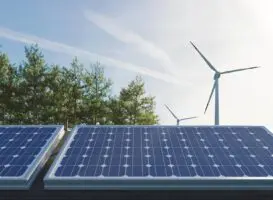Bloomberg reports that an apparent stalemate has emerged over funding for a plan by the Czech Republic to build two nuclear reactors for a total cost of $10 billion. CEZ is currently the only European country with a nuclear project out to bid, but there are now questions whether it has the financial muscle to support the project, even though it is 70 per cent owned by the government and has a market capitalization of $23 billion. “The project simply won’t be financially profitable. It’s unrealistic, ” Bloomberg quoted Ivan Kotev, an analyst with Prague-based advisory firm Candole Partners as saying.
Two of the problems, according to Matthias Heck, a Frankfurt based analyst with Macquarie Group, have been falling electricity costs in the Czech Republic and neighbouring Germany, and the decline in the value of carbon permits, which he said means the project may not be able to pay for itself. According to Candole Partners, CEZ would also have to borrow more than $9 billion to fund the project, pushing its debt levels way beyond its European peers. To fund that debt financing, the company may have to cut its dividend, which currently delivers around 2 per cent of the government’s annual revenues. Bloomberg quoted analysts as saying that CEZ would need to seek state help to cope with the enormous price tag, as well as high insurance premiums and interest rates, and is seeking loan guarantees from the state as well.
The final problem is that none of the suppliers shortlisted by CEZ – Areva, Westinghouse or Russia’s Rosatom – have been able to demonstrate that their proposed latest model reactors are operational. The Czechs want to see the reactors up and running before they make a decision, and that’s not the case with any of the designs so far. “There is a possibility that CEZ won’t accept any of the bids,” Vaclav Bartuska, the Czech government’s special envoy for nuclear energy, told Bloomberg in an interview in Prague. “To be honest, at this point not one of the three bidders has convinced us he can build on cost and on time.”
Silex included in climate index
Australian solar technology developer and installer, and uranium enrichment specialist Silex Systems has been added to the HSBC Global Climate Change Benchmark Index, joining 345 other stocks in the category, which spans low-carbon energy production, energy efficiency and energy management, water, waste and pollution control, and carbon traders and investors. Each company must have a market capitalization of at least $450 million, Silex, which has a market value of around $640 million, is the only Australian low-carbon producer to meet that thresh-hold. Hopefully, one day there will be more.
Meanwhile, HSBC says the benchmark index has returned 8 per cent so far this year, trailing broader global equities which returns 11 per cent (up to March 2). The biggest reason was the poor performance of the low-carbon energy production, particularly integrated power producers, nuclear and wind stocks. Solar stocks did well, until about mid February, but fuel cells did even better, gaining 35 per cent. Pollution control and transport efficiency were also strong.
The best performing of the four sectors in the benchmark index has been in climate finance, with listed stocks delivering of return of 17 per cent so far this year. HSBC says this mirrors the partial rebound in European carbon prices following historic lows reached late last year. It says energy efficiency and management offers the best value, with a projected EPS growth rates of 12 per cent for the year, supported by rising oil prices, and current low price earnings rations.
South Africa’s green leap
While Australia struggles to kick-start the rollout of large-scale renewable projects – either through the renewable energy target or via Solar Flagships and other funding programs – South Africa is showing how it could be done through its series of renewable energy auctions; an idea taken up in Australia only by the ACT government. The SA government said it has received 79 bids for 31 wind and solar projects with a total capacity of around 1.4GW and worth around $2.5 billion.
This is the second such auction and the bidding in the latest round has been more aggressive than the first, with the winners likely to come in well below the tariff caps that were set. South Africa, which like Australia is heavily dependent on coal-fired generation, has set a 42 per cent renewable energy target by 2030. Contracts for an initial 28 renewable energy projects with a capacity of 1.4GW were announced last December. The winning projects include solar thermal projects using solar towers and parabolic troughs, and numerous solar PV installations. Two preferred bidders, Gestamp Wind and Suzlon Energy, intend to establish manufacturing facilities in South Africa to meet demand.








